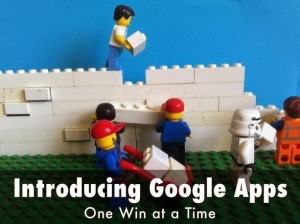 |
| creative commons licensed (BY-SA) flickr photo by mrkrndvs: http://flickr.com/photos/aaron_davis/15133211880 |
I was left challenged recently by a post from +Dean Shareski who questioned the focus of conferences on ideas and instead argued that we should be looking for connections. He made the statement that “if you leave with one or two people you can continue to learn with you’ve done well.” This has been my goal of late, to create a space where people can connect, rather than provide a list of links and ideas.
At Melbourne Google Summit, I felt I did this by creating an activity where participants collaboratively curated a guide of how to introduce Google Apps in order to make learning and teaching more doable. A point that +Bill Ferriter suggests when he states, “technology lowers barriers, making the kinds of higher order learning experiences that matter infinitely more doable.”
To me change isn’t just about bringing in Google Apps and enforcing it on everyone from above, it is just as much about the small ideas that help others buy-in to the benefits in going Google. I therefore thought that if we bring together the collective knowledge of the room that those there would not only have a great resource to take back to their schools, but a range of connections to continue learning with. For as +David Weinberger puts it, “The smartest person in the room is the room.”
What eventuated though as I roamed the room was that I ended up helping people with a myriad of other problems, from having two accounts linked to the one email account, how to use Google Groups to make sharing easier and downloading the new Google Slides app on iPad. This was awesome, for just as we need to be open as learners to new opportunities and connections, so to as teachers do we need to be open to adjusting the focus based on the situation at hand. However, would this have been the case if those in the room were not willing to raise their hand and admit that there is something that they don’t know? Admit that something isn’t necessarily working the way that it is meant to?
It occurred to me afterwards in reflection that just as it is important to leave a conference with one or two new connections, I feel that it also important to come away with a small win, a solution to a conundrum that has really been bugging you. Something personal, something important to you and your situation. This is especially the case at a technology conference where what is on offer is only the tip of the iceberg to the potential of what is possible. The big challenge then is asking, for it is only if you ask shall you receive.
For those interested, here are the slides to my presentation:
Introducing Google Apps One Win at a Time – Created with Haiku Deck, presentation software that inspires
While here is a link to the awesome presentation that those in attendance made: Introducing Google Apps – A Crowd Sourced Guide
If you enjoy what you read here, feel free to sign up for my monthly newsletter to catch up on all things learning, edtech and storytelling.
Ask and You Shall Receive – A Reflection on Personalised Professional Development by Aaron Davis is licensed under a Creative Commons Attribution-ShareAlike 4.0 International License.

Mentions